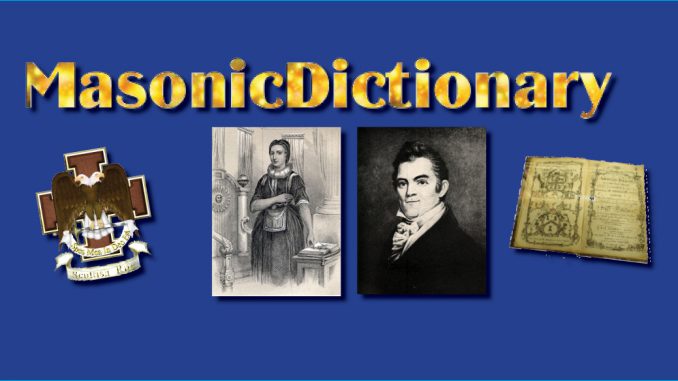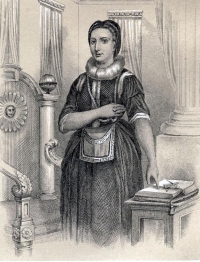
 A plant well known to the ancients, the Greek name of which signifies never withering. It is the Cetosia cristata of the botanists. The dry nature of the flowers causes them to retain their freshness for a very long time, and Pliny says, although incorrectly, that if thrown into water they will bloom anew.
A plant well known to the ancients, the Greek name of which signifies never withering. It is the Cetosia cristata of the botanists. The dry nature of the flowers causes them to retain their freshness for a very long time, and Pliny says, although incorrectly, that if thrown into water they will bloom anew.
Hence it is a symbol of immortality and was used by the ancients in their funeral rites.
The flower is often placed on coffins at the present day with a like symbolic meaning, and therefore is one of the decorations of a Lodge of Sorrow.
– Source: Mackey’s Encyclopedia of Freemasonry
Order of the Amaranth
The Order of the Amaranth is a fraternal organization composed of Master Masons and their properly qualified female relatives. In its teachings, the members are emphatically reminded of their duties to God, to their country and to their fellow beings. They are urged to portray, by precept and example, their belief in the “Golden Rule” and by conforming to the virtues inherent in TRUTH, FAITH, WISDOM and CHARITY they can prove to others the goodness promulgated by the Order.
The extent of its Charitable Work and overall Benevolence is limited only by the opportunities that exist, and the ability to secure adequate funding. Its Philanthropic project is the Amaranth Diabetes Foundation. The flag of the appropriate country is prominently displayed at all meetings creating a strong sentiment of patriotism and devotion to the respective land that we love.
Conspicuously upon the Altar is placed the Holy Bible, the inspired word of God. Its divine truths send forth its sacred luster to all parts of the globe and is used among us as a symbol of the will of God. It reminds us of the omnipresence of the “Almighty” overshadowing us with His Divine Love and dispensing His blessings among us.
The leaves of the Amaranth plant (like the “Laurel”) is indicative of distinction and honor, and when formed into the “Amaranthine Wreath” with its never ending circle, is typical of the bond of fraternal friendship which encircles our beloved order, and which has a central place upon our Standard (Ceremonial Flag), surrounding the “Crown and Sword”.
Brief History:
About three hundred years ago in Sweden, a little girl just six years old named Christina became the ruler of that country. As she grew to womanhood, she was very fond of things beautiful, cultured and of social importance. During her reign as Queen, she created the Order of the Amarantha for the ladies and knights of her royal court, building it around the character of Lady Amarantha, who was portrayed as being a beautiful, virtuous and talented Lady of the Court. Queen Christina herself acted the part of Lady Amarantha; and the name of the Order was probably chosen because of the beautiful never-fading red Amaranthus flowers growing in profusion in Spain and Portugal. The Order was perpetuated and exists in the Royal Court of Sweden now. As originally created by Queen Christina, the Royal and Social Order of the Amarantha had no more connection with Masonry than did the beautiful Catholic Cathedrals constructed by masons and by builders of old, before the structure of Masonry was developed and embodied in our present day Fraternity. So let’s leave the Swedish Order of the Amarantha and return to more modern days.
In the middle of the 19th century, a number of societies were started in America, in which females could become members. The two that we are most concerned with are the “Order of the Eastern Star” and the “Order of the Amaranth”.
From the report of Honored Lady Grace Scheninger, a member of the present Order who visited Sweden in recent years, we find the following interesting information: “One account was given by an Englishman, himself a member of the order and a long time guest of Christina’s Court, seems the most plausible and in keeping with the lessons handed down to us in our present Order. He says: “The person kneeling down before the Queen held up his hands between the Queen’s hands: she declared his duty in that order, to maintain and defend virtue and the honor of virtuous ladies, to endeavor to correct vice, to perform honorable actions, to keep his faith inviolable, in all matters relating to honor and virtuous performances; which the Court promised to observe. The Queen put upon his left shoulder and tied under his right arm a scarf of crimson taffeta, with a broad silver fringe; and the jewel of the order hung in the scarf, it was about the compass of half a crown; it was made of gold, a round wreath wrought and enameled like a laurel, and in the midst thereof two great AA reversed, set thick with diamonds, the two AA for the first and last letters of Amaranta, and about the wreath was written ‘dolce nella memoria’, ‘Sweet is the memory’, that is of a certain noble and famous great lady named Amaranta, who was an eminent pattern and example of the highest honor and virtue, in memory of whom this Court was instituted.”
It again appears in France when the Lodges of Adoption were organized about 1730, each of which was under the control of a Masonic Lodge until June 10, 1974, when the Grand Orient of France by an Edict assumed control of all Lodges of Adoption.
In 1860, Brother James B. Taylor from Newark, NJ, attempted to compose the material to start a New “Society”. He learned that in 1653, Queen Christina of Sweden,, had combined a group of “Sir Knights” and “Ladies” together to have “gala” parties. She called this group the “Order of the Amaranta”.
Brother Taylor was so impressed with what he had read that he copied many of the symbols and much of the phraseology used therein. He even copied the name, the “Order of the Amaranth”.
Brother Robert Macoy, who was in control of the “Order of the Eastern Star” around 1870, decided that it might be advisable to add two or more degrees to it. Then, in 1873, he formed the “Rite of Adoption”, with the “Order of the Eastern Star” as the first, or initiatory degree, and “The Queen of the South” as the second degree and the “Order of the Amaranth” as the third, or highest degree. His plan was to have these degrees given separately but under the control of one body.
Both Eastern Star “Chapters” and Amaranth “Courts” were included in the Adoptive Rite Ritual. The Order of the Amaranth was officially organized June 14, 1873 in New York City as part of the Rite of Adoption. Robert Macoy was the first Supreme Royal Patron and Rob Morris was the first Supreme Recorder of the Order under Robert Macoy. In the Rite of Adoption Ritual it was said: “This Organization shall be known as the ‘Rite of Adoption of the World’ and shall consist of the degrees of the Eastern Star, the Queen of the South and the Amaranth.”
Brother Robert Macoy obtained the material that Brother Taylor had written about the Amaranth, and revised and perfected it into “ritualistic” form so that it could be used as the ritual for the third degree. From 1873 until 1921, all members of the Amaranth were required to join the “Order of the Eastern Star” first, and to maintain this membership to be able to stay members of the Amaranth.
In 1921, by mutual agreement, this requirement ceased. They are now completely separate organizations.
In 1895, Robert Macoy died. New officers arranged for the Supreme Council of the “Order of the Amaranth” to hold its first meeting of its officers and members in 1897. Since then, and “Annual Meeting” has been held each year. Under the jurisdiction of the Supreme Council we have forty-three Grand Courts (each is Statewide), located in the United States, Canada, Australia, England, Phillippines and Scotland. Also, Subordinate Courts (local) in Hawaii, New Zealand and Ireland (there are a few individual states in the U.S. that do not have Grand Courts).
The “Order of the Amaranth” means many things to many people. To its early members it meant the opportunity to build upon the strong foundation of TRUTH, FAITH, WISDOM and CHARITY. A fraternal order having for its purpose, service to humanity, set to the music of fraternal love. To its present members, the “Order of the Amaranth” means a challenge to build higher and stronger upon these foundations of Fraternal Love and Service. It means the Hand of Fraternal Friendship to those in distress. It means Thinking and Remembering about its members in their hours of sorrow and sickness.
Most of all, it means the opportunity to serve its Fellowmen, to enjoy the close fraternal ties of mutual respect and understanding to enrich our lives with friendship worth far more than gold or silver.
Source – S.K. Roland E. Randall, P.G.R.P. Maryland
AMARANTH, ORDER OF THE
An organization instituted by Queen Christina of Sweden in 1653 and numbering thirty-one members, there being fifteen knights and fifteen ladies, and the Queen officiating as Grand Mistress. The insignia consisted two letters A interlaced, one being inverted, within a laurel crown, and bearing the motto Dolce nella memoria, these Words being the Italian for Sweet to the memory. The annual festival of this equestrian and chivalric Order was held at the Epiphany. A society of a similar name was arranged by J. B. Taylor at Newark, New Jersey, and was developed by Robert Macoy of New York City in 1883. A Supreme Council was organized June 14, 1883 with Brother Robert Macoy as Supreme Patron and Dr. Rob Morris as Supreme Recorder. In 1887 he published the Rite of Adoption containing the standard ritual of Degrees of the Eastern Star, the Queen of the South, and the Amaranth. Brother Willis D. Engle, in his History of the Order of the Eastern Star (page 135), says that the Amaranth was intended by Brother Macoy as the Third and Highest Degree in his revised system of Adoptive Masonry.
The ritualistic ceremonies planned by Brother Macoy were changed in 1915. The work is military in character. The object of the instruction is charity.
The organization has been incorporated, owns its own ritual and emblem, and has Courts in the several States of the Union, and in Canada, British Columbia, and the Philippines. The membership comprises Master Masons and their Wives, Mothers, Sisters, Widows, and Daughters.
– Source: Mackey’s Encyclopedia of Freemasonry
